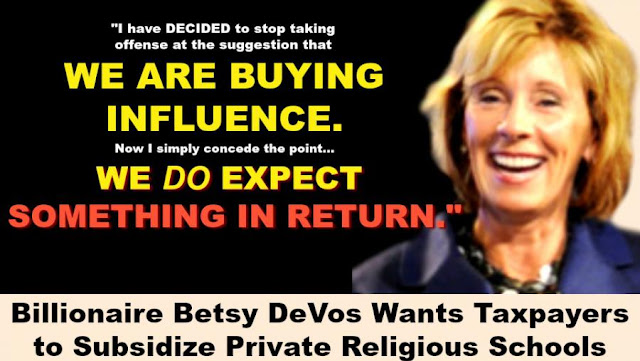Democrats Look To Close Conflict-Of-Interest Loophole Linked To Betsy DeVos
New bill would require nominees to disclose “dark money” they’ve donated or solicited.

WASHINGTON ― Democrats introduced legislation on Wednesday to close a conflict-of-interest loophole spotlighted after President Donald Trump nominated Republican megadonor Betsy DeVos to be Secretary of Education and Scott Pruitt to be head of the Environmental Protection Agency.
At the time of her confirmation, DeVos and her wealthy family were known to have made around $20 million in publicly reported contributions to support Republican candidates. What remained unknown was how much she and her family donated to non-disclosing “dark money” nonprofits that helped elect senators who would vote on her nomination. For Pruitt, the lack of disclosure went the other way, as he had solicited contributions from donors for a dark money nonprofit during his time as Oklahoma’s attorney general.
The legislation, sponsored by Sen. Sheldon Whitehouse (D-R.I.) and Rep. Ted Deutch (D-Fla.), would require executive branch nominees to disclose whether they solicited or contributed money to political candidates, political parties, political action committees and, most importantly, nondisclosing nonprofits active in elections. Additionally, nominees would be required to enter into agreements with the Office of Government Ethics that would explain how they would avoid conflicts of interest after confirmation.
Whitehouse and Deutch cite the Supreme Court’s 2010 Citizens United decision as the main reason why this new conflict-of-interest disclosure is needed. That decision gave corporations the right to spend unlimited amounts of money on elections so long as their spending was independent of the candidates they supported.
A side effect of the decision was that nonprofits that do not disclose their donors were suddenly empowered to spend on direct electoral appeals. This led to a rapid increase in dark money spent to elect congressmen, senators, governors and presidents.
“Citizens United unleashed a tsunami of corporate spending in our politics, threatening to drown out the voices of individual citizens. It’s time to update our ethics rules to prevent that spending from hatching serious conflicts of interest at the top levels of our government,” Whitehouse said in a statement.
“We ask high-level appointees to disclose their financial relationships, which may have a serious influence on the work they do if confirmed. We also need to ask about fundraising relationships, which can be just as thorny. That will help us avoid potentially serious conflicts of interest and the scandal that would follow,” he said.
Deutch said, “Under current law, billionaires can anonymously flood our elections with unlimited amounts of money one day and become heads of an agencies the next. We can’t let the failures in our campaign finance laws be compounded by failures in our ethics laws.”
Sens. Tom Udall (D-N.M.), Chris Van Hollen (D-Md.), Al Franken (D-Minn.) and Tom Carper (D-Del.) cosponsored the Senate bill. Reps. John Sarbanes (D-Md.), Zoe Lofgren (D-Calif.), Mark Pocan (D-Wisc.), David Cicilline (D-R.I.) and Jan Schakowsky (D-Ill.) cosponsored the House bill.


